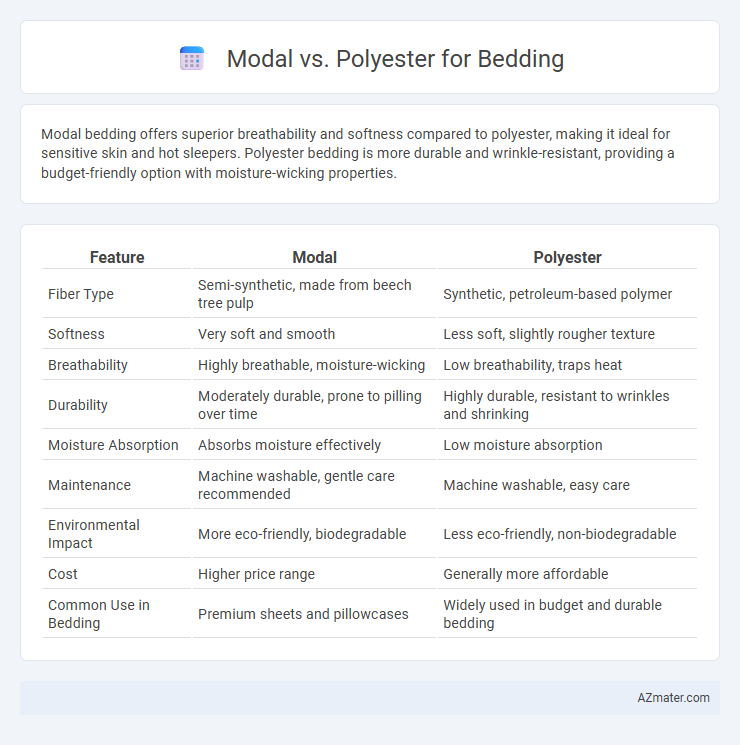Modal bedding offers superior breathability and softness compared to polyester, making it ideal for sensitive skin and hot sleepers. Polyester bedding is more durable and wrinkle-resistant, providing a budget-friendly option with moisture-wicking properties.
Table of Comparison
| Feature | Modal | Polyester |
|---|---|---|
| Fiber Type | Semi-synthetic, made from beech tree pulp | Synthetic, petroleum-based polymer |
| Softness | Very soft and smooth | Less soft, slightly rougher texture |
| Breathability | Highly breathable, moisture-wicking | Low breathability, traps heat |
| Durability | Moderately durable, prone to pilling over time | Highly durable, resistant to wrinkles and shrinking |
| Moisture Absorption | Absorbs moisture effectively | Low moisture absorption |
| Maintenance | Machine washable, gentle care recommended | Machine washable, easy care |
| Environmental Impact | More eco-friendly, biodegradable | Less eco-friendly, non-biodegradable |
| Cost | Higher price range | Generally more affordable |
| Common Use in Bedding | Premium sheets and pillowcases | Widely used in budget and durable bedding |
Introduction to Modal and Polyester Bedding
Modal bedding, made from semi-synthetic fibers derived from beech tree pulp, offers exceptional breathability, softness, and moisture-wicking properties ideal for sensitive skin and warm climates. Polyester bedding, composed of synthetic fibers, provides durability, wrinkle resistance, and affordability, making it a popular choice for long-lasting, easy-care bedding. Both fabrics cater to different needs, with Modal excelling in comfort and sustainability, while Polyester emphasizes practicality and budget-friendly options.
What is Modal Fabric?
Modal fabric is a type of semi-synthetic fiber made from beech tree pulp, known for its superior softness and breathability compared to polyester. It has excellent moisture-wicking properties, making it ideal for bedding to provide a cool and comfortable sleep environment. Unlike polyester, which is petroleum-based and less breathable, modal offers a more natural feel and enhanced durability with resistance to shrinkage and pilling.
What is Polyester Fabric?
Polyester fabric is a synthetic textile made from petroleum-based polymers, renowned for its durability, wrinkle resistance, and moisture-wicking properties. Its quick-drying nature and affordability make it a popular choice for bedding that requires easy maintenance and long-lasting performance. Unlike natural fibers, polyester resists shrinking and stretching, ensuring sheets maintain their shape over time.
Comfort and Softness Comparison
Modal fabric offers exceptional softness and breathability, making it highly comfortable for bedding, as it feels smooth against the skin and wicks moisture effectively. Polyester, while durable and wrinkle-resistant, tends to be less breathable and may retain heat, which can reduce overall comfort during sleep. Modal's natural fibers contribute to a lighter, more breathable texture compared to the synthetic, sometimes less soft hand-feel of polyester bedding.
Breathability and Temperature Regulation
Modal fabric offers superior breathability and moisture-wicking properties compared to polyester, making it ideal for regulating temperature and keeping sleepers cool. Polyester tends to trap heat and moisture, often leading to a warmer sleeping environment and less comfort during hot conditions. Modal's natural fibers enhance airflow and promote evaporation, supporting a more balanced and comfortable sleep climate.
Durability and Longevity
Modal bedding offers superior durability compared to polyester due to its natural cellulose fibers derived from beech trees, which provide softness without sacrificing strength. Polyester bedding, made from synthetic fibers, tends to be more resistant to wrinkles and shrinking but may degrade faster with frequent washing and exposure to heat. Over time, Modal retains its smooth texture and breathability longer than polyester, making it a better investment for long-lasting bedding.
Moisture-Wicking Abilities
Modal fabric excels in moisture-wicking due to its high absorbency and breathability, making it ideal for bedding that stays dry and comfortable throughout the night. Polyester, while durable and quick-drying, tends to trap moisture and heat, potentially leading to less effective moisture management in bedding applications. Choosing modal bedding enhances sweat absorption and airflow, promoting a cooler and more comfortable sleep environment compared to polyester options.
Eco-Friendliness and Sustainability
Modal, derived from beech tree pulp, is highly regarded for its eco-friendliness due to its biodegradable properties and sustainable production process involving renewable raw materials and less water usage. Polyester, a synthetic fabric made from petroleum-based products, has a significant environmental footprint due to its reliance on fossil fuels, non-biodegradability, and microplastic pollution during washing. Choosing modal over polyester for bedding supports sustainability efforts by reducing plastic waste and minimizing resource consumption in textile manufacturing.
Maintenance and Care Tips
Modal bedding requires gentle washing in cold water with mild detergent to preserve its softness and prevent shrinking, while polyester bedding is more durable, allowing machine wash in warm water and resistance to wrinkles. Modal fibers are prone to pilling and should be air-dried or tumble-dried on low heat, whereas polyester dries quickly and retains shape with minimal ironing. Both materials benefit from avoiding bleach to extend fabric life, but polyester's stain resistance makes it easier to maintain overall cleanliness compared to modal.
Which is Better for Bedding: Modal or Polyester?
Modal offers superior breathability and moisture-wicking properties compared to polyester, making it ideal for comfortable, temperature-regulating bedding. Polyester excels in durability, wrinkle resistance, and affordability but lacks the natural softness and absorbency found in modal. Choosing between modal and polyester depends on prioritizing comfort and breathability or durability and ease of care for bedding.

Infographic: Modal vs Polyester for Bedding
 azmater.com
azmater.com